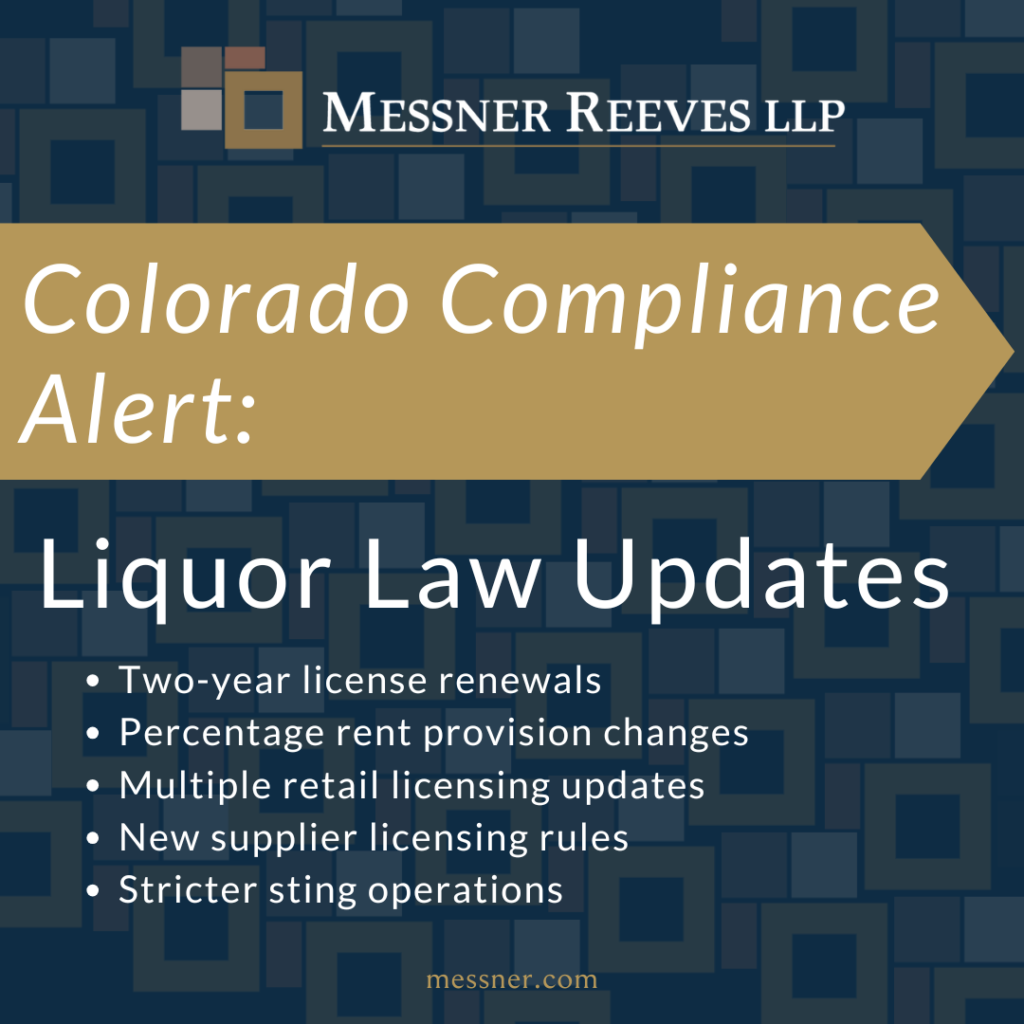
As of January 1, 2025, the Colorado Department of Revenue’s Liquor and Tobacco Enforcement Division implemented new liquor rules to enforce SB24-231, which became law in 2024. The new law vastly modified the alcohol industry in Colorado based on recommendations received from Colorado’s Alcohol Beverage Liquor Advisory Group. Here are a few of the major changes associated with SB24-231 and the Division’s new rules:
General Changes
Two-Year License Renewals
SB24-231 now allows existing and new licensees to apply for biennial renewals with the Division either on their upcoming renewals or new applications, meaning their liquor license will be valid for a period of two years, as opposed to one year under the prior law (though please note that the fees are still split into annual payments). For existing and new retail licensees, however, local licensing authorities are not required to abide by biennial renewals unless they adopt a resolution or ordinance for the same. We expect several local licensing authorities to retain the annual renewal, meaning retail licensees need to be aware of different renewal dates at the local and state levels.
Percentage Rent Provisions Can Make Landlords Part of a Liquor License
Prior to SB24-231, many landlords across Colorado implemented percentage rent provisions into their leases, which allowed them to collect a certain percentage of tenants’ sales revenues in addition to base rent. Now, landlords receiving percentage rent of more than 18% of gross revenue from a tenant’s sale of alcohol can be deemed to hold an ownership interest in a tenant’s liquor license and will be subject to disclosure requirements and background checks. Please note that the new rules do not calculate the 18% within a specific duration (i.e., a month, quarter, or year of sales), implying that it could be applicable within any duration. These types of percentage rent provisions could subject landlords to liability or other restrictions under the Colorado Liquor Code and create other inherent conflicts with the parties’ lease agreements and existing insurance policies. In addition, tenants could face obstacles in acquiring the necessary authority to modify, transfer, or perform other actions to their liquor licenses if their landlords have been deemed owners of the same. Landlords and tenants with existing percentage rent provisions in their leases that meet the above definition should consider taking this time to review the same.
Changes to Retail Licenses
Lodging and Entertainment Facility Licenses
Before SB24-231, lodging and entertainment facilities were licensed under the same type of license. Based on the growing number of facilities under this type of license, SB24-231 separated the license into their own types: a lodging facility license and an entertainment facility license. Now, when current lodging and entertainment facility licensees ready their renewals, it will be their responsibility to determine which new license type is appropriate on their renewal to properly convert their license to the correct type.
Removal of Public Hearing Requirement
The previous law required local licensing authorities (cities, towns, and counties) to hold a public hearing on an application for a new retail liquor license, including hybrid retail liquor licenses (distillers pubs, vintners pubs, and brew pubs). Public hearings provide additional opportunities for qualified residents and business owners or managers to provide public comment on the issuance of a retail liquor license. SB24-231 made the public hearing requirement discretionary, meaning localities are free to dispense with the same. Based on our experience to date, however, most localities will likely still require some form of public hearing, though they may start loosening such a requirement if no public opposition is received on a new application.
Retail Liquor Stores Can Liquidate Inventory
Under the previous law, retail liquor stores that were going out of business without buyers to take over operations had few options to dispose of their alcohol inventory, which were typically limited to attempting to sell the inventory back to their wholesalers or destroying it. SB24-231 now allows such retail liquor stores to sell their alcohol inventory to other retail liquor stores under strict notice and pricing conditions. By selling inventory in this manner, however, the retail liquor store that is going out of business could have its license terminated, and if terminated, a new retail liquor store license cannot be issued to such location, or a location within 1500 feet of the same, for five years. Accordingly, landlords should be prepared to be involved in these situations to assist with potential alternatives or resolutions, as the consequences of a license termination from this process could have a material impact on their properties and surrounding properties.
Increase in Cap for Retail-to-Retail Liquor Sales
The previous law limited the amount of alcohol beverages that on-premise retailers could purchase from retail liquor stores, liquor licensed drug stores, or fermented malt beverage and wine retailers to $2,000 per year. SB24-231 increased this cap to $7,000, and the cap will continue to increase annually based on relevant inflation data.
Alcohol Sales Allowed on Christmas Day
The previous law prohibited off-premises retailers, such as retail liquor stores, liquor licensed drug stores, and fermented malt beverage and wine retailers, and on-premise retailers with to-go or delivery permits from selling alcohol in sealed containers on Christmas day. In keeping up with the holiday spirit, SB24-231 now allows these retailers to sell sealed container alcohol on Christmas day.
Changes to Supplier Licenses
Two Additional Noncontiguous Locations for Manufacturers
While the previous law only allowed wineries to produce wine at up to two noncontiguous locations, SB24-231 allows all manufacturers, including limited wineries, to produce alcohol beverages at up to two noncontiguous locations upon receiving Division approval. This means that manufacturers can now operate a primary facility with up to two additional facilities that are within a 10-mile radius to the primary facility. This can be particularly helpful in situations where manufacturers wish to bottle, label, or store their rectified product at other locations that may be more feasible, convenient, or spacious for their operations. These noncontiguous locations can be approved during the initial application process or through a modification of the current license with the Division.
Ownership and Financial Restrictions Between Wholesalers and Importers Repealed
SB24-231 repealed certain ownership and financial restrictions on wholesalers and importers, aligning Colorado with other states following this same type of licensing configuration. This means that wholesalers can now obtain importers licenses and vice versa, which can streamline and expand operations for each of these licensees. Please note that the requirements for registering alcohol brands and designating wholesalers remain intact, particularly for nonresident manufacturers and malt liquor importers.
Other Compliance Updates to Know
Stricter Sting Operations
In addition to the new law changes, local jurisdictions are also beefing up their sting operations for retail licensees and manufacturers and wholesalers with sales rooms. Local and state authorities regularly send underage cadets into retail establishments to attempt to purchase alcohol with either an expired or underage identification card. Local authorities are now sending cadets into these retail establishments with valid identification cards that do not match any of the characteristics of such cadets (i.e., the picture on the identification card does not resemble the cadet). Retail licensees should take this as a sign to reinforce and bolster their training policies, preferably with the help of certified responsible vendors, to help ensure their employees are adequately reviewing identification cards of each customer.
Please note that these highlighted changes are meant to be informational and do not fully define the conditions or requirements that may be associated with the same. If you want to learn more about these changes, or need help navigating the same, give our firm a call to see how we can help.



